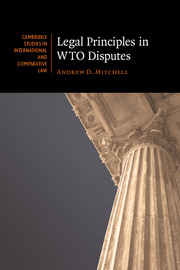Book contents
- Frontmatter
- Contents
- Table of WTO agreements
- Table of WTO cases
- Table of general abbreviations
- Table of WTO award and report abbreviations
- Foreword
- Acknowledgements
- 1 Introduction
- Part I A framework for principles
- Part II Selected principles examined
- 4 Good faith
- 5 Due process
- 6 Proportionality
- 7 Special and differential treatment
- 8 Conclusion
- Bibliography
- Index
5 - Due process
Published online by Cambridge University Press: 27 February 2010
- Frontmatter
- Contents
- Table of WTO agreements
- Table of WTO cases
- Table of general abbreviations
- Table of WTO award and report abbreviations
- Foreword
- Acknowledgements
- 1 Introduction
- Part I A framework for principles
- Part II Selected principles examined
- 4 Good faith
- 5 Due process
- 6 Proportionality
- 7 Special and differential treatment
- 8 Conclusion
- Bibliography
- Index
Summary
Introduction
The principle of ‘due process’ (also called ‘fundamental fairness’, ‘procedural fairness’, or ‘natural justice’) broadly requires administrative and judicial proceedings to be fair. Administrative and judicial systems attempt to achieve due process by exercising their discretion in a fair manner and by developing procedural or evidentiary rules explaining how rights, duties, powers, and liabilities are administered. As will be seen in this chapter, the principle of due process is difficult to define precisely, because the demands of fairness depend on the circumstances. For example, it may be necessary to balance an individual's interest in additional procedures with the value and cost of such procedures. Thus, in particular circumstances, due process might require a full trial, whereas in other circumstances, basic notice and the right to speak might be sufficient. Considerations of due process might also conflict. For instance, parties' rights to be heard and give evidence might weigh in favour of the last-minute introduction of evidence. On the other hand, the need for equality between the parties and their right to have sufficient time to respond and challenge evidence might weigh against its introduction. Discretion is required to resolve such conflicts.
Due process is a necessary component of any legal system seeking legitimacy and effectiveness. The dispute settlement system of the WTO is no exception. Howse suggests that ‘the further removed the decision-maker is from responsibility to a particular electorate, the greater the extent to which legitimacy depends on procedural fairness itself’.
- Type
- Chapter
- Information
- Legal Principles in WTO Disputes , pp. 145 - 176Publisher: Cambridge University PressPrint publication year: 2008

